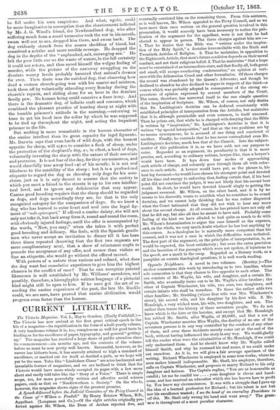A Speech delivered before the Judicial Committee of the Privy
Council in the Cause of " Wilson v. Fendall." By Henry Bristow Wilson, B.D., Appellant. (Longman and Co.)—Of the eight articles originally pre- ferred against Mr. Wilson, the Dean of Arches rejected five, and eventually convicted him on the remaining three. From this sentence, as is well known, Mr. Wilson appealed to the Privy Council, and as we have more than once written on the general question involved in this prosecution, it would scarcely have been necessary to notice the pub- lication of the argument for the appellant, were it not that he had elected to appear in person. The three charges against him are :- 1. That he denies that the Bible was " written under the inspira- tion of the Holy Spirit," a doctrine irreconcilable with the Sixth and Twentieth Articles of Religion. 2. That he maintains, in opposition to the Eighteenth Article, that men's future condition depends on their moral conduct, and not their religions belief. 3. That he maintains " that a hope must be entertained of an intermediate state, and that finally all, both great and small, will escape everlasting condemnation," an opinion at vari- ance with the Athanasian Creed and other formularies. Of these charges the second was abandoned by the Queen's Advocate; and though he declined to abandon he also declined to argue in support of the third—a course which was probably adopted in consequence of the strong ex- pressions of opinion expressed by several members of the Court. The cause, therefore, has narrowed itself to the one simple question of the inspiration of Scripture. Mr. Wilson, of course, not only denies that Dr. Lushington's doctrine can be deduced consistently with established principles of interpretation from the Articles, but maintains that it is, although permissible and even common, in itself unsound. Then he points on% that while he is charged with denying that the Bible is written by "inspiration," Dr. Lushington's doctrine is that it is written "by special interposition," and that as the two positions are by no means synonymous, he is accused of one thing and convicted of another. Finally, he contends that he has never contradicted even Dr. Lushington's doctrine, much less that of the Church. Into the subject- matter of this publication it is, as we have said, not our purpose to enter. Regarded as an argument, its peculiarity is that it is more precise, and, according to ordinary notions, lawyer-like, than a lawyer's would have been. It lays down four modes of approaching each article of charge, and solemnly goes through them all with refer- ence to each article. A lawyer would have put, as the phrase is, his best leg foremost—he would have chosen his strongest point and devoted all his time and energy to enforcing that, feeling certain that, if his best point did not convince the judges, it was not likely that his second beat would. In short, he would have devoted himself singly to getting the judgment reversed. Mr. Wilson, on the other hand, and it is by no means to his discredit, wants to establish what he considers to be sound doctrine, and we cannot help thinking that ho was rather disgusted when the Court intimated that they did not wish to hear any more about the second charge. At all events, he has printed here not only all that he did say, but also all that he meant to have said. Probably some feeling of the kind we have alluded to had quite as much to do with Mr. Wilson's determination to argue the case himself as the expense, and, on the whole, we very much doubt whether ho has lost anything by this course. As a theologian he is naturally more competent than his counsel, and it was not a case in which the difficulties were technical. The first part of the argument, on the principles of interpretation, is, as would be expected, the least satisfactory ; but even the extra precision and the insertion of the passages which were not spoken, if injurious to the speech, are a merit in the essay. Regarded as a literary work, as a pamphlet on certain theological questions, it is well worth reading.






























 Previous page
Previous page